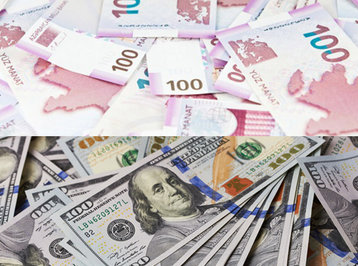Will strong dollar hit manat?

By Nigar Orujova
The last move by the U.S. Federal Reserves may be costly for many countries around the world, and Azerbaijan is not an exception.
The Fed has raised interest rates by 0.25 percentage points, which means the base rate was increased between 0.25 percent and 0.5 percent per annum. This move expects to echo around the world, increasing pressure at the economics already shattered by the financial crisis, as 60 percent of the world’s international reserves are kept in the U.S. dollars today.
The tendency for strengthening of the U.S. dollar may contribute to weakening of the national currencies around the world, especially of those countries with a ‘free floating’ currency rate.
The South Caucus nation of Azerbaijan is still positive about its future as the country is controlling its currency rate and has no plan to make changes in the state budget for 2016.
Azerbaijan is continuing to hold the manat rate by means of reserves at its disposal. In early 2015, Azerbaijani manat has already lost about 34 percent of its cost following the devaluation.
Commenting on the Fed’s decision, the Central Bank of Azerbaijan said the exchange rate of manat-dollar continues to change in a stable dynamics.
On December 17, the official rate of the U.S. dollar and euro against the Azerbaijani manat was set at 1.0499 and 1.1394 manat, respectively.
Meanwhile, experts believe that the Fed's decision will not lead to another devaluation of manat.
Economist Samir Aliyev said there will be only minor changes in the exchange rate of manat.
"Today, the rate of manat is not determined by the market. If Azerbaijan switched to 'free floating' exchange rate, a one percent change in the dollar against manat rate would be observed after the Fed's decision. However, the price of the U.S. dollar in Azerbaijan is defined by the Central Bank and the Fed's decision does not directly affect the Azerbaijani manat," said the expert.
Economist Vugar Bayramov shares this view, saying that : "The psychological pressure in the Azerbaijani society will grow, but from an economic point of view, the Fed's decision will not have a serious impact on the exchange rate of manat.
The foreign exchange market in Azerbaijan is regulated and, therefore, the rate of manat will depend on the decision of the Central Bank and the tools they used, he stressed.
Raising interest rates is likely to lead to an increase in the cost of credit resources attracted in dollars, which will reduce foreign demand for products from the U.S. This, in turn, will slow exports from the country and make it more expensive.
The situation will inevitably affect the world trade, because today 40 percent of sales and 50 percent of the profits of U.S. companies account for foreign markets.
For Azerbaijan, the U.S. is one of the major foreign trade partners. At present, the U.S. investment in Azerbaijan’s economy totals $10 billion. There are 235 American companies functioning in Azerbaijan, and today the U.S. is interested not only in the oil field, but also in the non-oil sector, including logistics, pharmaceuticals, information technology, etc.
Moreover, further strengthening of the U.S. dollar will lead to serious problems for the developing countries because of the high level of foreign debt, denominated in dollars in both the public and private sectors.
Azerbaijan, however, can avoid these risks because of the low volume of public debt, totaling 12.4 percent of GDP, and long-term credit resources, even despite the fact that 66 percent of the loans taken by Azerbaijan under state guarantee, denominated in the U.S. currency.
However, strengthening of the U.S. dollar also means further cheapening of already inexpensive hydrocarbons. The world oil prices immediately responded to the Fed's decision: following the auction, they fell more than 5 percent. Brent now costs $37.22 per barrel, while the price of WTI is $35.46 per barrel.
The current price on the main export brand of Azerbaijani oil – Azeri Light – is even lower than the most pessimistic forecast of the government. The budget forecasts for 2016 has been prepared taking into account three scenarios: pessimistic, which laid the basis for the price of oil at $40 for barrel, the basic with $50 for barrel, and optimistic with $60 per barrel.
Azerbaijani government will not have to adjust the budget forecasts for the next year, if expectations of Fed chief Janet Yellen on stabilization of oil prices are justified.
Yellen said there is some limit below which oil prices were unlikely to fall, meaning they were likely to stabilize.
In the meantime, the country’s budget and the entire economy are gradually reoriented to non-oil sector. This year, the share of this sector in budget revenues already expected to reach 65 percent, and next year, its share is planned to rise to 71 percent.
In any scenario, the next year is expected to be tough especially for developing, oil producing countries, and will be the high time to switch to the cost saving regime.
Here we are to serve you with news right now. It does not cost much, but worth your attention.
Choose to support open, independent, quality journalism and subscribe on a monthly basis.
By subscribing to our online newspaper, you can have full digital access to all news, analysis, and much more.
You can also follow AzerNEWS on Twitter @AzerNewsAz or Facebook @AzerNewsNewspaper
Thank you!
